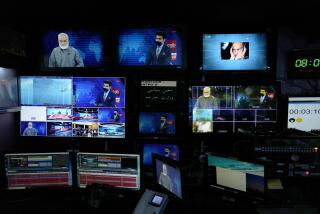Pakistan Limits Taliban Briefings
- Share via
ISLAMABAD, Pakistan — Concerned about the escalating propaganda campaign operating out of the Taliban’s embassy here, the Pakistani government on Wednesday clamped down on news conferences by the Afghan regime’s ambassador.
The Pakistani action mutes one of the last remaining Taliban voices to the outside world and removes a tool used to rally international opposition to the U.S. and boost the morale of Taliban fighters in Afghanistan.
In what had become a daily routine here, Taliban Ambassador Abdul Salam Zaeef used the briefings--attended by hundreds of international journalists--as a platform to announce civilian casualties that he said were caused by the ongoing U.S. bombing campaign in Afghanistan and to boast of Taliban successes on the battlefield.
Pakistani Foreign Ministry spokesman Aziz Khan said the step was taken on the grounds that the briefings violated the diplomatic “third country” protocol.
“You cannot malign a third country that has diplomatic relations with the host country,” Khan said. Using his diplomatic base in Pakistan, the last remaining country to officially recognize the Taliban government, Zaeef has routinely targeted the United States, Britain and, more recently, the United Nations.
Khan refused to comment on whether the United States or other countries had put pressure on Pakistan to shut down the daily briefings, described in one newspaper here as a “media bazaar.”
At the same time that Pakistan was restricting the Taliban’s propaganda efforts, the United States was accelerating its own campaign to influence the overseas public.
This week, the State Department sent Pakistani newspapers a three-page information sheet, titled “Catalogue of Lies,” disputing many of the claims made by the Taliban government in the daily briefings.
Organized in the format of “incident, allegation, fact,” the document, produced in Washington, responded to 19 Taliban allegations between Sept. 30 and Oct. 24.
A typical entry was for Oct. 21, when the Taliban claimed that a hospital in Afghanistan had been bombed by U.S. aircraft, killing more than 100 people. The U.S. response in the document was: “Errant bomb from F/A-18 landed in open field near a senior citizens’ home about 300 feet from the intended target, a vehicle storage facility at a military complex near Herat.”
The Oct. 11 entry said: “Taliban ambassador to Pakistan claims U.S. is targeting civilians, putting the civilian death toll at more than 77.”
The U.S. response: “Cannot be independently verified.” Of the 19 entries, the U.S. asserted that seven “cannot be independently verified.”
Pakistan’s president, Gen. Pervez Musharraf, who is on an overseas trip that will take him to the United States for meetings with President Bush this weekend, has domestic reasons for restricting the Taliban briefings.
Fundamentalist religious parties are using the Taliban claims of massive civilian casualties to rally opposition to Pakistan’s support for the anti-terrorism coalition. The Musharraf government, which recently initiated a crackdown on militant pro-Taliban groups, faces a nationwide transportation strike Friday, called by the religious parties and other opposition groups to protest the bombing campaign.
“We are concerned by the ambassador’s use of words like ‘genocide’ and ‘cleansing’ and ‘deliberate attacks on civilians,’ ” a Foreign Ministry official said.
Khan, the Foreign Ministry spokesman, insisted that the action wasn’t a total ban on Taliban news conferences. “They can hold as many as they want as long as they don’t criticize a third country,” Khan said. He said Zaeef was informed of the restrictions Tuesday.
The Taliban statements have become increasingly fantastic, including unsubstantiated claims that Taliban foot soldiers had shot down U.S. helicopters and planes containing hundreds of troops.
Although most of the claims have been dismissed as lies by the U.S., they have been accepted as fact by many media outlets in the Muslim world. The sensational Urdu-language newspapers in Pakistan regularly cite the Taliban claims.
The U.S. and Britain recently set up 24-hour public relations offices in London and Washington to counter the accusations.
More to Read
Sign up for Essential California
The most important California stories and recommendations in your inbox every morning.
You may occasionally receive promotional content from the Los Angeles Times.













